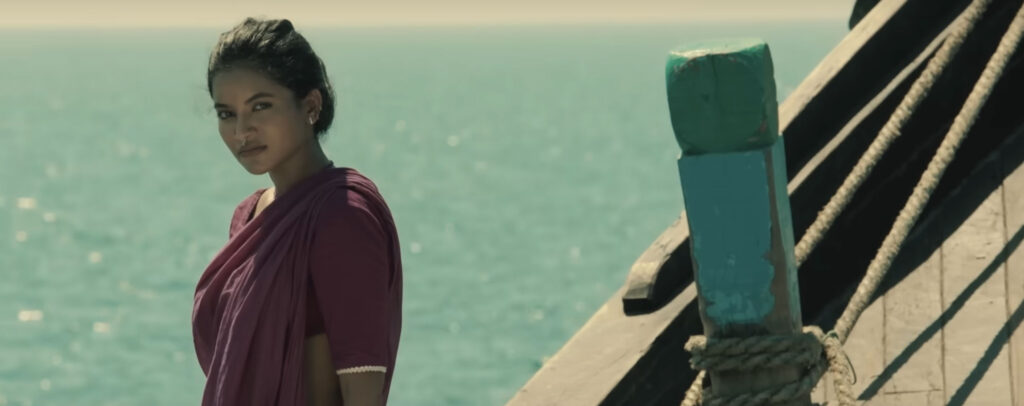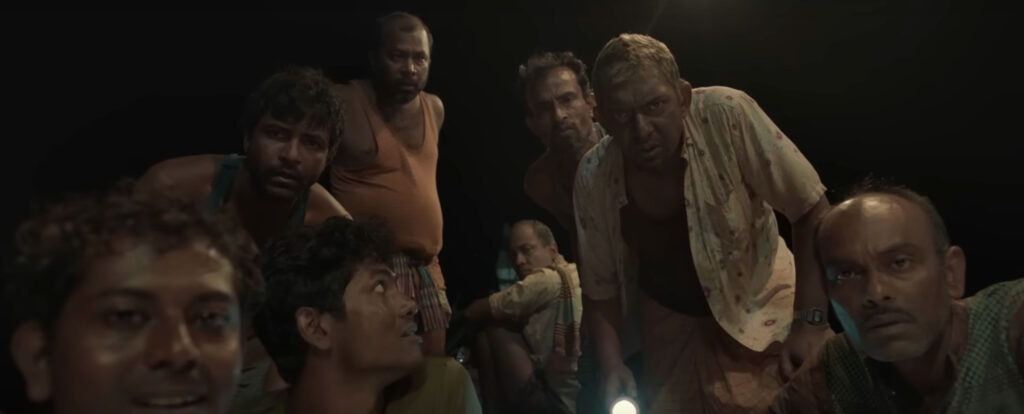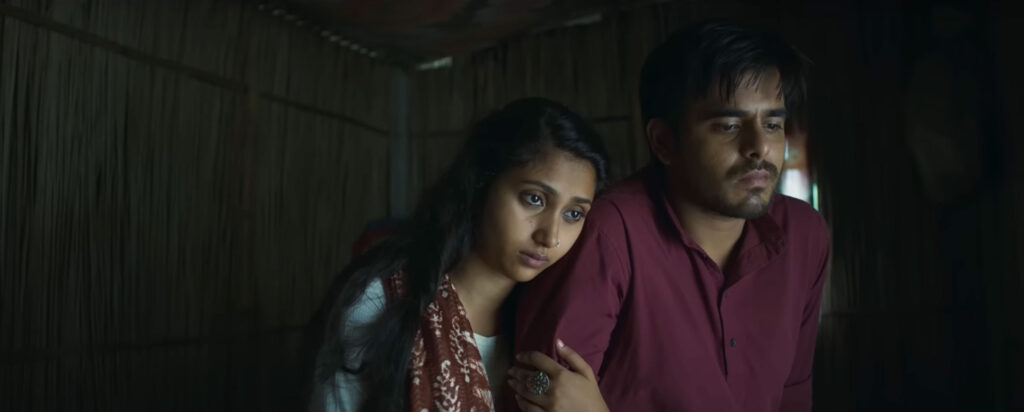September 6, 2022
by Carla Hay

Directed by Mejbaur Rahman Sumon
Bengali with subtitles
Culture Representation: Taking place in the Bay of Bengal near Bangladesh, the horror film “Hawa” has a cast of characters from Bangladesh representing the working-class and middle-class.
Culture Clash: After a mysterious woman gets caught in a net from a fishing boat, she is pulled aboard, and strange things start to happen to the fishermen on the boat.
Culture Audience: “Hawa” will appeal primarily to people who don’t mind watching slow-paced horror movies that save the best scenes for the last third of the movie.

The “slow burn” horror movie “Hawa” doesn’t get to its most terrifying moments until the last third of the film, but the long buildup to this terror is worth the wait. “Hawa” has a lot to say about gender dynamics when there’s only one woman in an isolated place with men. The movie takes its time in showing the increasing tension between the all-male team on a fishing boat (they are all fishermen for a living) and the mysterious young woman who literally gets ensnared in one of their nets.
Directed by Mejbaur Rahman Sumon, “Hawa” (which means “the wind” in Bengali) takes place entirely in a remote part of the Bay of Bengal, where the closest nation is Bangladesh. Sumon co-wrote the movie’s screenplay with DurSukorno Shahed Dhiman and Jaheen Faruque Ameen. (“Hawa” was filmed on St. Martin’s Island in the Bay of Bengal.) The movie’s central setting is a mid-sized fishing boat whose below-deck area is equipped with a furnace room, a storage area and some sleeping quarters.
During the fateful trip that’s depicted in this movie, there are eight members of the fishing team, including their captain, who are all men. Except for one brief scene in the movie, when another boat appears, the people on this fishing boat are isolated. It’s mentioned at one point that women aren’t allowed on these fishing trips.
The gender composition in this trip changes one night when they find a young woman caught in one of their nets. At first, she appears to be dead, but she’s actually unconscious. When the woman is brought on board and regains consciousness, she remains mute until a pivotal part of the story.
“Hawa” looks like a movie that could take place in an undetermined decade in the late 20th century or early 21st century. There is no mention of technology, such as the Internet or cell phones, to make contact with people. If the boat has a radio, it’s not seen or used.
About halfway through the movie, it’s revealed that the mystery woman’s name is Gulti (played by Nazifa Tushi). It’s also eventually revealed why Gulti was found in this part of bay that is so far from land and from other boats. Because she does not speak when she is first discovered, and she has no identification, the men decide that they will drop her off at the nearest town when their fishing trip is completed.
In the meantime, the fishermen decide that Gulti will have to do some work on the boat, in order to earn her place. Some of the men on the boat misinterpret Gulti’s silence for weakness. Two of the men try to sexually assault her on separate occasions. Gulti is able to fight them off, but her attackers hold grudges.
The first attempted rape happens when the boat’s domineering, middle-aged and arrogant captain Chaan Manjhi (played by Chanchal Chowdhury) tries to lure Gulti to go with him below deck to the furnace room to have a sexual encounter. He licks his lips lasciviously at her to make it known what his intentions are. As he tries to physically lead Gulti down to the furnace room, she pushes him away.
An enraged Chaan gets physically aggressive with Gulti. He calls her a “fucking whore” and tries to force her into the furnace room. Gulti is able to defend herself by taking a machete and getting Chaan to back off of her during their physical altercation on the deck. He’s so startled, he falls backward into the water and has to be rescued by members of his crew.
For the rest of the trip, Chaan tries to make Gulti as miserable as possible. He’s verbally abusive to her, and he orders her around like a slave. When she brings Chaan a drink, he says that serving him a drink isn’t “real work,” and she has to earn her place on the boat by doing work that’s a lot more physically demanding.
The second time that Gulti is almost raped, the attack comes from a middle-aged crew member named Eja (played by Sumon Anowar), who tries to physically subdue Gulti at the beginning of this sexual assault. Eja’s assault, which is even more prolonged than Chaan’s, involves Eja hitting Gulti, trying to remove her clothes, and grabbing Gulti to try to get her to do what he wants. Gulti successfully defends herself by eventually kicking Eja in the crotch, and he stops attacking her.
Not everyone on the boat wants to hurt Gulti. Most of the men don’t bother her and don’t interact with her much. But there’s one crew member in particular who goes out of his way to be kind to Gulti. He’s a young man named Ibrahim (played by Sariful Razz), nicknamed Iba, and he’s the boat’s friendly mechanic.
Iba is attracted to Gulti, and the feeling appears to be mutual. Iba is also the first person whom Gulti talks to on the boat. Iba and Gulti meet for secret late-night talks in the water. During one of their first conversations, she drops hints that she could be a mermaid.
The biggest flaw of “Hawa” is this 130-minute movie has some unnecessary scenes that drag down the pace of the movie. The first half of the movie is kind of a tedious slog that shows the men on the boat going through various power struggles and disagreements about the work that needs to be done. Early on in the movie, someone tries to steal fish for himself and quickly gets reprimanded for it by Chaan, who rules the boat like a dictator.
The other men on the boat are supporting characters whose personalities don’t leave much of an impression until the last third of the movie. Twin brothers Parkes (played by Rizvi Rizu) and Urkes (played by Shohel Mondol), who are in their 20s, are very close and look like they have a co-dependent relationship. The other crew members, whose ages range from 30s to 40s, are Nagu (played by Nasir Uddin Khan), Mora (played by Mahmud Alam) and Foni (palyed by Mahmud Alam), who have varying degrees of loyalty to Chaan.
“Hawa” has cinematography by Kamrul Hasan Khoshru and Tanveer Ahmed Shovon that effectively immerses viewers into the moods for the daytime and nighttime scenes. During the day, the fishing team is focused on work, but their isolation is still evident, because the boat is usually shown as the only one in the immediate area. At night, the atmosphere becomes more menacing and foreboding for anyone on board the ship.
What’s less realistic choices are in the makeup, costume design and hairstyle for Gulti, who appears in many scenes with perfectly applied makeup, her clothing well-styled, and her hair neatly combed or put up in a bun. Considering that she was found unconscious in the water while tangled in a net, it’s highly unlikely that she would have any makeup or beauty supplies with her, or that there would be any makeup on the boat. Gulti’s dress (the only outfit she has in the movie) sometimes also looks a little too neatly styled, when it should look more worn and tattered, considering everything that she goes through in the movie.
There’s a supernatural aspect to the story that could explain Gulti’s well-kept appearance, so viewers might have to suspend some disbelief when they see Gulti looking like a model on this very unglamorous and dirty boat. The men don’t seem to notice how Gulti manages to look picture-perfect in this rough environment. The men that do notice her physical appearance look at her from the angle of her sex appeal.
The troublemaking members of this fishing team feel more freedom to cause mischief and mayhem at night. And even though Chaan is the captain of the boat, even he can be vulnerable to anyone who has a reason to dislike him. He’s not only cruel to Gulti, but he’s also mean-spirited to members of the crew.
Viewers need patience to sit through the often-tedious first half of “Hawa” before the story gets a lot more interesting. Even though “Hawa” definitely needed tighter editing, the last third of the movie proves that it’s a memorable and suspenseful thriller. And the movie’s last image is haunting and very effective.
Jaaz Multimedia released “Hawa” in select U.S. cinemas on September 2, 2022. The movie was released in Bangladesh on July 29, 2022.


